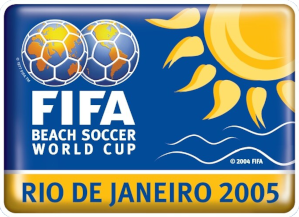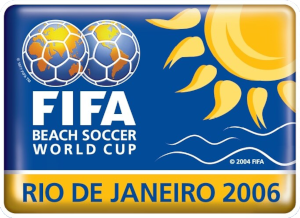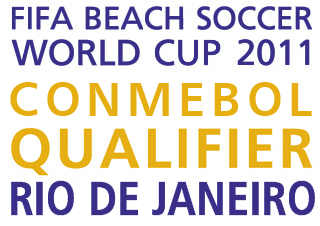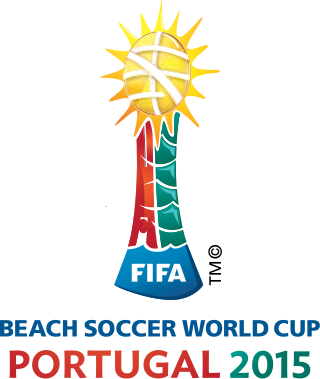
Beach soccer, also known as beach football, sand football or beasal, is a variant of association football played on a beach or some form of sand.

The Copa América 1989 football tournament was hosted by Brazil, from 1 to 16 July. All ten CONMEBOL member nations participated.

The 2000 FIFA Club World Championship was the inaugural FIFA Club World Cup, the world club championship for men's club association football teams. It took place in Brazil from 5 to 14 January 2000. FIFA as football's international governing body selected Brazil as the host nation on 8 June 1999 as the bid was found to be the strongest among four candidates. The draw was made at the Copacabana Palace in Rio de Janeiro on 14 October 1999. All matches were played in either Rio de Janeiro's Estádio do Maracanã or São Paulo's Estádio do Morumbi.

The 2005 FIFA Beach Soccer World Cup was the first edition of the FIFA Beach Soccer World Cup, an international beach soccer competition contest by men's national teams and organized by FIFA. Overall, it was the 11th edition of a world cup in beach soccer since its establishment with the first Beach Soccer World Championships in 1995. It took place in at Copacabana Beach in Rio de Janeiro, Brazil, between 8 and 15 May.
The 2006 CONCACAF Beach Soccer Championship, also known as the 2006 FIFA Beach Soccer World Cup qualifiers for (CONCACAF), was the first beach soccer championship for CONCACAF, held in September 2006, in Puntarenas, Costa Rica. The USA won the championship, with Canada finishing second. The two moved on to play in the 2006 FIFA Beach Soccer World Cup in Rio de Janeiro, Brazil from November 2 - November 12.

The 2006 FIFA Beach Soccer World Cup was the second edition of the FIFA Beach Soccer World Cup, governed by FIFA. Overall, this was the 12th edition of a world cup in beach soccer since the establishment of the Beach Soccer World Championships which ran from 1995–2004 but was not governed by FIFA. It took place in Rio de Janeiro, Brazil, from 2–12 November 2006.

The 2007 FIFA Beach Soccer World Cup was the third edition of the FIFA Beach Soccer World Cup, governed by FIFA. Overall, this was the 13th edition of a world cup in beach soccer since the establishment of the Beach Soccer World Championships which ran from 1995 to 2004 but was not governed by FIFA. It took place in Rio de Janeiro, Brazil, from 2–11 November 2007.

The 2008 FIFA Beach Soccer World Cup was the fourth edition of the FIFA Beach Soccer World Cup, governed by FIFA. Overall, this was the 14th edition of a world cup in beach soccer since the establishment of the Beach Soccer World Championships which ran from 1995–2004 but was not governed by FIFA. It took place in Marseille, France, in the Plages du Prado from 17 to 27 July 2008. It was the first tournament to take place outside Brazil.

The 1995 Beach Soccer World Championships was the first edition of the Beach Soccer World Championships, the most prestigious competition in international beach soccer contested by men's national teams until 2005, when the competition was then replaced by the second iteration of a world cup in beach soccer, the better known FIFA Beach Soccer World Cup. It was organised by Brazilian sports agency Koch Tavares.
The 1996 Beach Soccer World Championships was the second edition of the Beach Soccer World Championships, the most prestigious competition in international beach soccer contested by men's national teams until 2005, when the competition was then replaced by the second iteration of a world cup in beach soccer, the better known FIFA Beach Soccer World Cup. It was organised by Brazilian sports agency Koch Tavares.
The 2000 Beach Soccer World Championships was the sixth edition of the Beach Soccer World Championships, the most prestigious competition in international beach soccer contested by men's national teams until 2005, when the competition was then replaced by the second iteration of a world cup in beach soccer, the better known FIFA Beach Soccer World Cup. It was organised by Brazilian sports agency Koch Tavares.
The 2004 Beach Soccer World Championships was the tenth and final edition of the Beach Soccer World Championships, the most prestigious competition in international beach soccer contested by men's national teams; the following year, the competition was replaced by the second iteration of a world cup in beach soccer, the better known FIFA Beach Soccer World Cup. It was organized by Brazilian sports agency Koch Tavares in cooperation with and under the supervision of Beach Soccer Worldwide (BSWW), the sports governing body.
The BSWW Mundialito, often simply known as Mundialito, is an annual international beach soccer tournament that takes place between few select countries, which are invited to play at the tournament organized by Beach Soccer Worldwide (BSWW). First played in 1994 at Copacabana beach, Rio de Janeiro, Brazil, the competition was reignited in 1997 in Portugal, where it was held ever since until 2022. Few nations have won the tournament, those being only Brazil, Portugal, United States, and Spain.

The 2011 FIFA Beach Soccer World Cup CONMEBOL qualifier, also later and commonly known as the 2011 South American Beach Soccer Championship, was the fourth Beach Soccer World Cup qualification championship for South America, held from July 31– August 7 on Copacabana beach in Rio de Janeiro, Brazil. The tournament was originally scheduled to take place from 7 – 14 May 2011.

The 2015 FIFA Beach Soccer World Cup was the eighth edition of the FIFA Beach Soccer World Cup, the premier international beach soccer competition for men's national teams, which has been organized by FIFA since 2005. Overall, this was the 18th edition of a world cup in beach soccer since the establishment of the Beach Soccer World Championships which ran from 1995 to 2004 but was not governed by FIFA. It was also the third edition to take place under the biennial system introduced in 2009.
Group 1 of the 1962 FIFA World Cup took place from 30 May to 7 June 1962. The group consisted of Colombia, the Soviet Union, Uruguay, and Yugoslavia.
The South American section of the 2022 FIFA World Cup qualification acted as qualifiers for the 2022 FIFA World Cup, to be held in Qatar, for national teams which are members of the South American Football Confederation (CONMEBOL). A total of 4.5 slots in the final tournament were available for CONMEBOL teams.
The 2019 CONMEBOL qualifiers for the FIFA Beach Soccer World Cup, was the eighth edition of the Beach Soccer World Cup qualification championship contested by the men's national teams of South America to determine the best beach soccer nation on the continent, organised by CONMEBOL. The tournament acted as a qualifying event to the 2019 FIFA Beach Soccer World Cup in Asunción, Paraguay, with the top two finishing nations progressing to the finals in addition to Paraguay who qualify automatically as hosts.

The 2021 FIFA Beach Soccer World Cup was the 11th edition of the FIFA Beach Soccer World Cup. Overall, this was the 21st edition of a world cup in beach soccer since the establishment of the Beach Soccer World Championships which ran from 1995 to 2004 but was not governed by FIFA. This was the sixth tournament to take place biennially; the World Cup took place annually until 2009. The tournament took place in Moscow, capital of Russia, between 19 and 29 August 2021.
The 2021 FIFA Beach Soccer World Cup qualifiers for CONMEBOL was the ninth edition of the FIFA Beach Soccer World Cup qualification championship for South American men's national teams, and the third edition organized by CONMEBOL. Originally scheduled to be played in May 2021, it was eventually re-scheduled to be held from 26 June to 4 July 2021 in Rio de Janeiro, Brazil.











